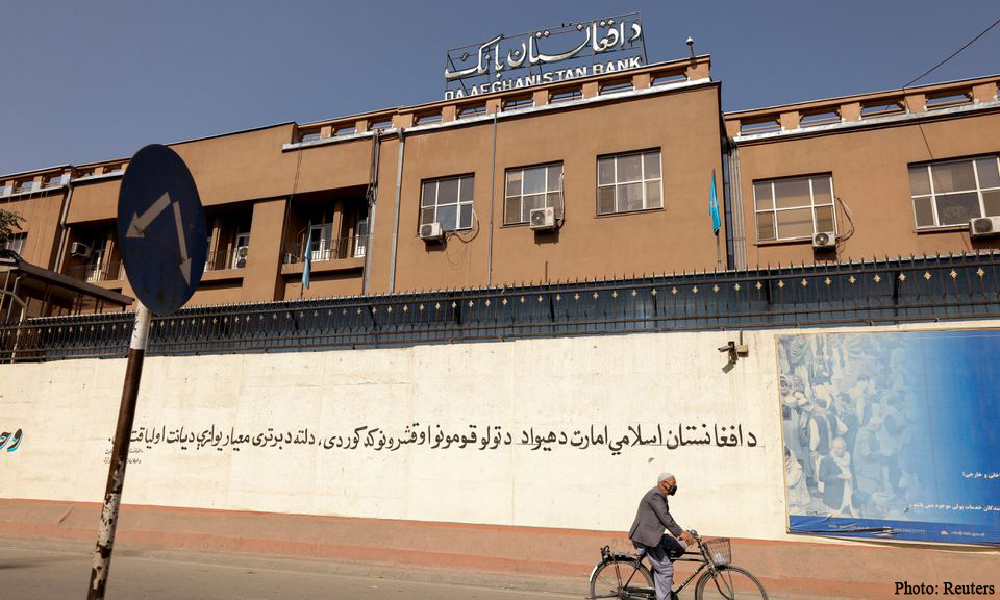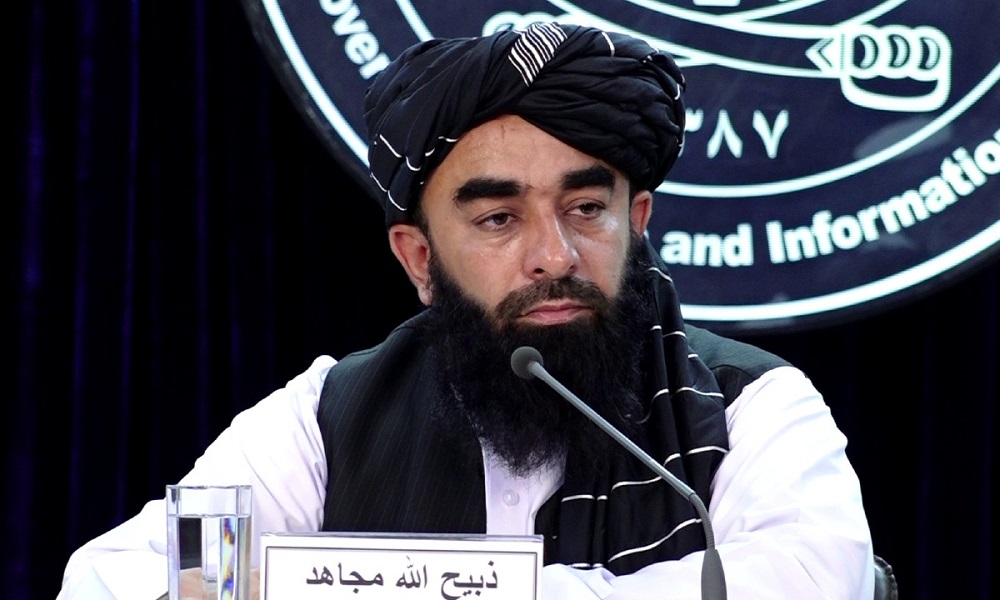Latest News
Audit fails to win U.S. backing for release of Afghan central-bank funds

A U.S. funded audit of Afghanistan's Islamic Emirate-run central bank has failed to win Washington's backing for a return of bank assets from a $3.5 billion Swiss-based trust fund, said two U.S. officials and a former U.S. official, a move that would help ease the country's financial crisis, Reuters reported.
The audit has not changed the U.S. Treasury's view that the bank must make reforms before the department will support disbursements from the Afghan Fund to Da Afghanistan Bank (DAB), said a U.S. Treasury official on condition of anonymity.
The Swiss-based Afghan Fund was set up last year with half of about $7 billion in central bank funds that were frozen in the Federal Reserve Bank of New York in August 2021 after IEA took control of the country as the last foreign forces withdrew following two decades of war.
DAB must show that it is free "from political influence and interference," said the Treasury official, referring to the need for professional bankers to replace the three IEA officials who oversee the bank and are under U.S. and U.N. sanctions.
It also must prove that it has "adequate" controls against money-laundering and terrorism financing and install a "reputable" independent monitor, said the Treasury official.
"Our assessment of DAB remains unchanged,” said one of the U.S. officials. Reuters quoted the two officials and the former U.S. official, who has knowledge of the U.S. position, spoke on condition of anonymity because of the confidentiality of the matter.
The IEA administration spokesman and a spokesperson for the Afghan central bank did not respond to request for comment.
Concerns in Washington and other capitals about the bank's leadership and anti-money laundering safeguards are at the heart of a standoff over the IEA's demand for the return of DAB cash frozen in the United States and other countries after the Islamic Emirate return.
Because the four-member board that oversees the trust fund must approve disbursements unanimously, the support of its U.S. government representative is essential.
Afghanistan remains mired in grave humanitarian and economic crises that some experts say has been worsened by U.S. restrictions hampering DAB's ability to perform key central bank functions, such as ensuring stable exchange rates and prices, read the report.
The audit, funded by the U.S. Agency for International Development (USAID) and conducted by an outside contractor, examined DAB's controls against money laundering and terrorism financing, and its banking oversight and payments departments, according to an April report by the U.S. Special Inspector General for Afghanistan Reconstruction (SIGAR).
The findings have not been made public, Reuters reported.
Calling the audit, a "preliminary assessment," the Treasury official said its "limitations" suggested that "more comprehensive third-party assessment efforts may be needed."
Shah Mehrabi, an Afghan-American economics professor who is on DAB's governing board and co-chairs the Afghan Fund board, said the audit - which he has not seen - was completed in March and currently is with the State Department.
The State Department declined to comment.
Mehrabi and his co-chair, Anwar ul-Haq Ahady, a former DAB governor and former finance minister, told Reuters that they would consider the findings once they are available.
Mehrabi said use of the Afghan Fund's assets should focus on stabilizing prices and ensuring banks had enough liquidity, as the entire financial system was at risk from declining foreign donor funds to Afghanistan.
The other $3.5 billion in DAB assets frozen in US is being sought in lawsuits against the IEA brought by families of victims of the Sept. 11, 2001, attacks on the United States. A U.S. judge in February ruled against the plaintiffs who are appealing.
Latest News
U.S. House approves bill on evacuation of Afghan allies

The U.S. House Of Representatives has passed a legislation on evacuation of Afghans who assisted Americans during the 20-year war in Afghanistan.
“The passage of the CARE Authorization Act of 2024 further underscores the commitment made by the U.S. government to safeguard those who served shoulder-to-shoulder with our personnel during the twenty-year mission in Afghanistan,” Congresswoman Dina Titus said in a statement.
“The State Department has made it clear: There is no deadline for the crucial job of protecting Afghan allies. By authorizing the Coordinator for Afghan Relocation Efforts at the State Department, we can more effectively relocate and resettle those who have qualified to immigrate to the U.S. as a result of their service to this country.”
In 2022 the State Department established a specialized office called the Coordinator for Afghan Relocation Efforts (CARE) to streamline and coordinate the ongoing relocation and resettlement process for eligible Afghans from Afghanistan and Pakistan to the United States.
The CARE Authorization Act of 2024 will formally authorize the CARE office at the State Department for three years and grant important authorities to advance its mission. These include an extension of authorities to enter into personal services contracts as well as measures to streamline the transfer of funds to and from other agencies involved in the Afghan relocation mission.
Latest News
Mujahid says IEA stands with media outlets

The Islamic Emirate’s spokesman Zabihullah Mujahid says the acting government is committed to supporting media outlets and they can operate within the framework of Islamic Sharia and national interests.
Marking World Television Day on Thursday, November 21, Mujahid said: “The Islamic Emirate of Afghanistan supports the media in general. Media can operate within the framework of Islamic Sharia and national interests.”
“As far as we are able, we cooperate with the media and the Afghan media currently have publications and they are broadcasting their publications well,” he added.
The United Nations General Assembly named November 21 as World Television Day in 1996.
“Since IEA’s takeover, of 184 national and local televisions, 57 television stations were shut down due to economic problems,” said Hojatullah Mujadadi, the head of Afghanistan Free Journalists' Association (AFJU).
Currently, about 370 visual, audio and print media are active in the country.
Latest News
Baradar says water crisis has negatively impacted relations between nations
Baradar expressed regret that although Afghanistan has vast water resources, effective and professional management has not been carried out in this area.

Deputy Prime Minister for Economic Affairs, Mullah Abdul Ghani Baradar, said on Thursday that the ongoing water crisis in the country has not only made neighboring countries face the problem of water scarcity, but it has also had a negative impact on political and economic relations between Afghanistan and these countries.
Speaking at a seminar held by the Ministry of Energy and Water, Baradar said that although water is a renewable natural resource, the shortage of water due to climate change, the increase in the level of water pollution, the growing demand of the people and its excessive consumption affects the country.
He expressed regret that although Afghanistan has vast water resources, effective and professional management has not been carried out in this area.
“It is now the responsibility of the Islamic Emirate of Afghanistan to fulfill its national duty for the optimal management of the country’s water resource,” Baradar said.
“With firm determination, we aim to use all available means to ensure sustainable development in water management.”
Last month, the United Nations Children's Fund (UNICEF) also warned that Afghanistan is experiencing a severe water crisis, and if no action is taken, Kabul’s underground water resources could be depleted by 2030.
In a message on X, UNICEF reported that Roza Otunbayeva, head of the United Nations Assistance Mission in Afghanistan (UNAMA), and Tajudeen Oyewale, head of UNICEF Afghanistan, visited a Kabul district to assess the city's water supply network.
Both officials expressed concern over the worsening water shortage problem in the capital.
"Water is life," UNICEF stated, emphasizing that rapid urbanization and climate change are accelerating the depletion of groundwater in Kabul.
“If we don't act now, we cannot stop this process."
The rapid population growth, unplanned construction of high-rise buildings, urban development without proper planning, and the excessive use of underground water resources are major factors contributing to the decline in both the quantity and quality of groundwater in Kabul.
Although Kabul has faced water shortages for years, the crisis has become more severe in recent times.
However, the Islamic Emirate is making concerted efforts to resolve the problem and thwart the crisis.
Three weeks ago, the office of the Deputy Prime Minister for Economic Affairs, said in a statement that plans to construct a total of 355 water reservoirs across the country were being implemented.
According to the statement, of the 355 dams, a number of them have already been completed and inaugurated while others are under construction.
Of these reservoirs, 138 are being constructed by the Ministry of Agriculture, Irrigation, and Livestock; 117 by the Ministry of Water and Energy; and 100 by the Ministry of Rural Rehabilitation and Development.
All of these dams are being funded by the Islamic Emirate of Afghanistan, the statement read.
The reservoirs are being constructed in numerous provinces to manage rainwater, prevent flooding, strengthen groundwater levels and for use by communities.
Iran’s water share
Late last year, Iranian Energy Minister Ali Akbar Mehrabian warned that if Afghanistan does not ensure Tehran receives its rightful amount of water from Helmand River, Iran will use legal and international means to resolve the problem.
Mehrabian stressed that Helmand River water is Iran's indisputable right, and that Iran takes the matter seriously.
“Water right is Iran's right and it is necessary to release it. Ensuring water rights is not optional, but it is mandatory based on the international treaty of 1351. Pursuing this matter is Iran's absolute right and we will not fail in this regard. The recent rains should cause the release of our water, and if not, we will take serious action based on international laws,” stressed Mehrabian.
At the time, the Islamic Emirate said it was committed to providing Iran with water from the Helmand River but due to drought, there is not enough water in the river to give Iran its share.
The Helmand River Water Treaty was signed between Afghanistan and Iran in 1973, according to which Iran has the right to receive 850 million cubic meters of water from Afghanistan annually.
-

 Sport5 days ago
Sport5 days agoFIFA unveils Innovative Club World Cup Trophy ahead of new tournament in 2025
-

 Regional5 days ago
Regional5 days agoIndia’s successful test of hypersonic missile puts it among elite group
-

 Latest News5 days ago
Latest News5 days agoTrump team compiling list of military officers responsible for US withdrawal from Afghanistan
-

 Latest News5 days ago
Latest News5 days agoCanada sent 19 failed asylum seekers back to Afghanistan last year
-

 Sport4 days ago
Sport4 days agoAbu Dhabi’s thrilling T10 tournament just days away
-

 World4 days ago
World4 days agoBiden allows Ukraine to use US arms to strike inside Russia
-

 Sport4 days ago
Sport4 days agoAfghanistan beat UAE by 169 runs in U19 tri-series
-

 Business5 days ago
Business5 days agoMullah Baradar inaugurates a blanket factory in Kabul
























